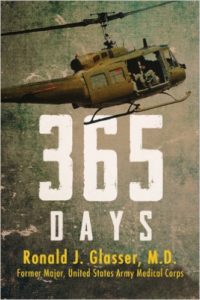This graphic account of the Vietnam War is told by a physician, a doctor who spent a year assigned to Zoma, an Army hospital in Japan. Author Ronald J. Glasser, M.D. arrived in Japan as a pediatrician, primarily to care for the children of officers and high-ranking government officials. However, because the monthly total of wounded averaged six to eight thousand per month, he was called on to treat the soldiers.
The title of the book, 365 Days, reflects the amount of time a tour of duty was: a year, 365 days. At first Doctor Glasser thought the stories, the war accounts he heard from his patients, were exaggerated, but he began to hear the same stories again and again. They were true, and the horrific accounts repeated themselves over and over.
Each chapter is told from a different viewpoint, vignettes about men who served in different capacities. We learn about the war from young infantry soldiers. We read about the men who operate “tracks,” described as any vehicle that runs on treads rather than wheels. We learn about war through the eyes of the of helicopter pilots who take incredible risks to rescue the injured or drop troops into hot areas, or deliver supplies. We learn from special forces personnel scattered throughout the country what it means to be highly trained, but then find that life in a Vietnam jungle is even worse than the most rigorous training.
We learn from explosive experts the danger they live with at every turn. We learn from young men eighteen or nineteen years old what it’s like to confront civilian villagers who have been trapped in war for years, people for whom survival is chancy at best, yet people who set traps that kill. We see medics who risk terrible danger to save their comrades, to do what they can to patch them up good enough to hold them until they can be flown to Japan, or who at least try to make dying less painful. And finally, we see from a physician’s side of things, the damage wreaked as a result of the terrifying stupidity of war, of trying to put back together young bodies that have been so destroyed, life will never be the same.
365 Days is not a book for the faint of heart; it is written in eloquently horrifying detail. But I still recommend it. It is a haunting tribute to those who served, a book about raw courage. It made me want to do whatever possible to avoid war. The human sacrifice is too great and has too many lasting consequences. There has to be a better way. The book doesn’t offer suggestions for avoidance, but rather the aftereffects when choosing war.


